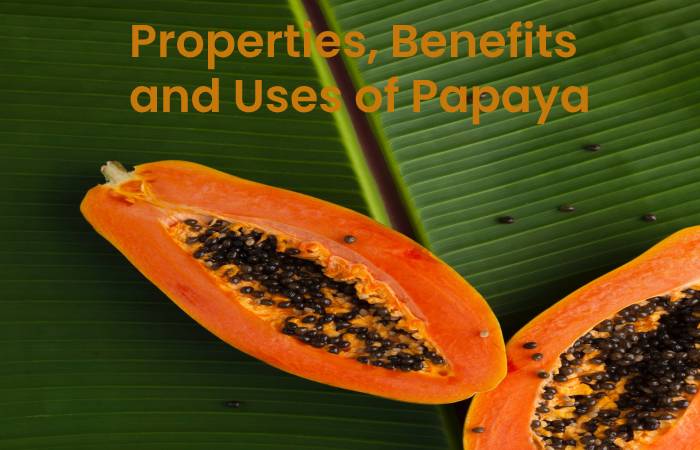Health Benefits of Papaya: It is a delicious tropical fruit. , perhaps somewhere in southern Mexico. Also, due to its incredible combination of delicious flavors and nutrients, it has earned the name “Fruit of Angels.”
Table of Contents.
Benefits of Papaya”, previously rare and exotic, is now available at most times of the year. It is prevalent in northeast Brazil, where the name knows it of mama.
The pleasant taste of the papaya pulp harmonizes with the preparation of drinks or cocktails with low alcohol content, which the sweetness and delicate fragrance of the fruit will maintain.
Its consumption is, for the moment limited, but rapidly growing due to its excellent nutritional and functional properties.
To characterize the fruit and the pulp are the content of vitamins ( vitamin C, vitamin E, and precursors of vitamin A ) and also particularly effective enzymes including papain, with an extreme subsidiary action on digestion
The Mayans worshiped the papaya tree, which they called the “tree of life.”
Apart from the fruit, the leaves, the seeds, and the milk of the papaya tree have medicinal properties. It is perfect for digestion and is widely consumed alone, in salads and smoothies.
Also Read: BENEFITS OF POWER SALAD BY THE HEALTH CARE GUARDIAN
Properties, Benefits of Papaya, and its Uses

The nutrients found in papaya believe in having a range of health benefits. They can help protect against several health conditions.
Digestion:
Papaya contains digestive enzymes that help break down food fairly quickly, making protein digestion easier. They also have a high content of soluble fiber and water that further facilitates digestion. Its seeds are beneficial in treating intestinal parasites in the body. The enzyme called papain, in papaya, helps prevent constipation.
Osteoporosis and Diabetes
People with type 1 diabetes who eat high-fiber diets have lower blood glucose levels. And people with type 2 diabetes may have improved blood sugar, lipids, and insulin levels. Small papaya provides about 3 grams of fiber, which is equivalent to just 17 grams of carbohydrates. Also, It contains anti-inflammatory enzymes that are beneficial for people who have arthritis and osteoporosis.
Anti-inflammatory properties:
Choline is an important and versatile nutrient found in papaya that aids our bodies in sleep, muscle movement, learning, and memory.
The structure of cell membranes will maintain by Choline, which aids in the transmission of nerve impulses, in the absorption of fat, and reduces chronic inflammation.
Papain and chymopapain, the two enzymes, in papayas, help reduce inflammation and improve the rate of burn healing. Additionally, antioxidants like Vitamins C, E, and beta carotene also help reduce inflammation.
Cancer:
Consuming the antioxidant beta-carotene found in papaya. It can reduce the risk of cancer, and it contains flavonoids. Such as beta-carotene, lutein, zeaxanthin, and cryptoxanthin. They act as antioxidants by fighting oxygen free radicals, thus helping to cure cancer.
Heart Health:
The fiber, potassium, and vitamin A content in papaya helps prevent heart disease. The abundant amount of potassium in papayas regulates the fluids of the cellular body, as well as controlling blood flow to maintain normal blood pressure.
It also reduces the harmful effects of sodium within the body. On the other hand, papaya contains zero cholesterol and a high amount of fiber that helps lower high cholesterol levels. It protects against various heart diseases.
Menstrual problems:
Papaya is effective in controlling menstrual irregularities in women and relieves menstrual pain.
Contraception:
Papaya contains papain that helps in aiding digestion; it can use as a meat softener. As it is high in fiber and water content, both of which help prevent constipation and promote regularity and a healthy digestive system. It is often used by women to prevent pregnancy.
Immunity:
Papaya is rich in vitamins A C and K, and Low vitamin K intake has an increased risk of bone fracture.
It contains Adequate vitamin K as it improves calcium absorption In the body to strengthen and rebuild bones.
It also can reduce urinary calcium excretion expanding the immunity of the body and therefore, helping in the prevention of fever, cold, and flu.
So, consumption is essential for good health.
Skin And Hair Health:
When used topically, papaya puree appears to be beneficial in promoting wound healing and preventing infection of burned areas.
The researchers believe that the proteolytic enzymes chymopapain and papain in papaya are responsible for their beneficial effects.
Ointments containing the enzyme papain are also used to treat pressure sores (bedsores). Papaya is also ideal for hair because it has vitamin A. The nutrient is necessary for the production of sebum. Which keeps hair hydrated. Vitamin A is also essential for the growth of all body tissues, including the skin and hair.
Adequate intake of vitamin C, which contains in papaya, is necessary for the construction and maintenance of collagen, which provides structure to the skin.
Nutritional Information Benefits of Papaya

The following nutritional information for 1 cup (145 g) of raw papaya, is cut into 1-inch cubes.
Calories: 62
Fat: 0.4g
Sodium: 11.6mg
Carbohydrates: 16g
Fiber: 25g
Sugars: 11g
Protein: 0.7g
Hawaiian papayas have yellow-green skin and are much smaller than the Mexican type, weighing about a pound.
The pulp is bright orange or pinkish, depending on the variety. With small black seeds grouped in the center. The flavor is sweet and juicy. Hawaiian papayas are papayas commonly found in supermarkets. Mexican papayas are much larger than Hawaii’s and can grow up to 10 pounds.
Papayas are rich in vitamin C, and a single medium fruit provides 224 percent of the recommended daily intake.
Half of the Benefits of Papaya has Approximately:
They also have group B vitamins, alpha- and beta-carotene, lutein and zeaxanthin, vitamin E, calcium, potassium, vitamin K, and lycopene, a powerful antioxidant most commonly associated with tomatoes.
The Recipes
There are many easy ways to add papaya to a diet. The fruit is tough to eat as it is very juicy. but keep in mind the following feeding methods and recipes:
How to Eat Papaya to Achieve the Benefits of Papaya
When choosing or eating papaya, the fresh look of It with reddish-orange skin that is soft to the touch, just cut it like a melon, remove the seeds, and enjoy.
Papaya seeds are edible but have a bitter, pungent taste. With the help of a spoon, it is possible to remove the soft meat from the fruit.
Papaya is a smooth, versatile fruit. It can incorporate into many recipes. Consider the following sample
Risks and Allergies

People having latex allergy can also be allergic to papaya. as It contains enzymes called chitinases. Might be a chance reaction between latex and the foods that contain them. For some, ripe papaya may have an unpleasant smell.
You can reduce this smell by mixing the cut of the fruit with the lemon juice. The seeds of the papaya, although an unpleasant taste for some, are safe for consumption.
There is a possibility of allergy to papaya. The American Academy of Allergy, Asthma, and Immunology ( AAAI ) reports that if you are allergic to mango, pistachios, or cashew, you may also react when exposed to papaya.
The allergies to latex may also be associated with allergies to papaya.
If you suspect an allergy to papaya or any of the other noted substances, speak to your healthcare provider for a personalized medical diagnosis.


